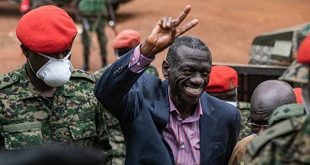
By Joan Akello
Will he be the Judiciary’s messiah?
Bart Katureebe’s appointment as a Chief Justice (CJ) has created a lot of excitement, mostly across the legal fraternity. Not so surprising. Uganda has not had a CJ for two years and Katureebe’s near-spotless-two decades-long legal career merits this reception.
But given the depth of the crisis in Uganda’s judiciary, Katureebe’s biggest challenge might be to first deal with the high expectations that his appointment has come with. Fortunately, the new CJ is conscious of this.
“I feel very honoured and challenged,” Katureebe told The Independent immediately after his appointment, “I hope I can live up to the expectations of the people because I have been told that people have generally expressed support. They think I will do something in the Judiciary, that I’ll continue to administer justice fairly and impartially and those are challenges.”

President Museveni made the appointment of Katureebe as CJ and Stephen Kavuma as his deputy known to Speaker of Parliament, Rebecca Kadaga, in a March 2 letter.
Katureebe had been a favourite amongst those the Judicial Service Commission (JSC),which is charged with recruiting judicial staff, had forwarded to Museveni in June 2013. Justice Esther Kisaakye and Principal Judge Yorokamu Bamwine had also been nominated.
Museveni had instead reappointed BenjaminOdoki on a two year contract sparking a court case, criticism and divisions at the heart of the judiciary, and a fight against former Attorney General Peter Nyombi, who endorsed the President’s decision. Many were against the President’s decision and endorsing that decision contributed to Nyombi’s woes. The lawyer’s body, Uganda Law Society (ULS) issued him with a certificate of incompetence.
Even amidst the excitement surrounding Katureebe’s appointment, some law activists, remain unimpressed.
“Why should the President run business like that, as though the crippling of the judiciary, through the non-appointment of a CJ all these years, does not matter?” says Jackie Asiimwe- Mwesige.
With not much to explain the delay to appoint him CJ, critics blame Nyombi, and Odoki for having accepted reappointment knowing he was past his retirement age, and Museveni for delaying the appointment.
Odoki is blamed for not rejecting the proposal from the onset. But he says he was appointed as an acting Justice in the Supreme Court and never served as CJ and, therefore, never broke any law.
So much relief
With Katureebe’s appointment, Nyombi is seen as the biggest loser. JSC chairman James Ogoola, who held several meetings with Museveni, legislators, and was even willing to testify in the Constitutional Court as a witness, appears vindicated.
Kutureebe comes with a wealth of experience, the reason, city lawyer Nicholas Opiyo, says his appointment brings “so much relief”.
“Sanity has finally prevailed,” Opiyo said before sending a barb at the former AG, “It had to take the back of Nyombi.”
Nyombi was seen as part of the problem in a long drawn out process that delayed Katureebe’s coming. He had for instance directed a Constitutional Court appeal over the CJ’s appointment.
To George Kasozi, an Associate Professor and Dean Faculty of Law at Bishop Stuart University, Katureebe’s personality and attributes are “in tandem with the attributes of a sound judicial officer”.
“He commands professional maturity, which many legal philosophers (jurists) have identified as a cornerstone attribute,” Kasozi told The Independent. “I am sure there is no lawyer in Uganda who may fault him in his legal advice to the government when he was its principal legal advisor as the Attorney General.”
Katureebe, served as AG from 1996, resigned in 2001 to join private practice and started a law firm, Kampala Associated Advocates. He was appointed a Supreme Court judge in 2005, a position he still held until his new post.
ULS President, Ruth Sebatindira says Katureebe represents hope for the Judiciary. She hopes that his appointment will be followed with constitutional reforms dealing with the timelines within which a Chief Justice must be appointed.
The ideal situation, for her, is for a CJ to be appointed three to six months before the retirement of a serving CJ so that the handover is done immediately and allows for smooth transition and maybe mentoring for those six months before the serving CJ leaves.
Sebatindira is banking on Katureebe’s “high integrity, commitment to constitutionalism and high performance standards” and expects these to shine throughout his leadership.
However, those who claim the President has never wanted an independent judiciary, felt that it was these same attributes that had stood in the way of his appointment. With an election coming, critics claimed Museveni did not want to risk appointing a principled judge like Katureebe, who in case of a case against Museveni would stick with the law.
But such claims ignore the fact that in the 2006 elections case, Katureebe was one of the judges that ruled against a re-run in favour of opposition leader, Kizza Besigye. Katureebe is also prized as the first AG to defend government in court, and deliver a victory against David Tinyefuza, who wanted to resign from the army after falling out with President Museveni over remarks that elements in the army were the reason the war in the north had dragged. Court decided against Tinyefuza. Katureebe also represented government before an international tribunal in a case over plundering DR Congo resources.
But Katureebe would rather not dwell on the past.“The country must have a chief justice when one retires whether it coincides with an election taking place in the same month or same day,” Katureebe, who appeared ready to take on his new assignment said,”It is not right to politicise when the president does his constitutional duty.”
His immediate predecessor Odoki says that fortunately for Katureebe, the judiciary is solid in terms of having administrative structures, linkages with stakeholders, and is increasingly getting more resources.
During his tenure, 13 High Court Circuits, 7 High Court Divisions, 49 magisterial areas, and District Court Circuit structures were established to take justice delivery services closer to the people. There are expansion plans to have more circuits such as 18 for High Court, 89 Magisterial Areas and the Anti- Corruption Court was also established to contribute to the fight against Corruption in the country.
Odoki is also credited for the Alternative Dispute Resolution, Plea Bargain, and the Small Claim Procedure (SCP) initiative in which all civil matters including land, family and civil are taken through mandatory mediation, in line with the Judicature (Mediation) Rules in 2013 to see the number or severity of the charges against an accused person or their punishment reduced and a claim mediated by a judicial officer to reach a quick agreement, without involving lawyers, and not going through lengthy and costly court process respectively.
In addition, Odoki says, the institution could have crumbled in the last two years but, even without a leader, all courts have been functioning. But how they function has been in the spotlight over delays and corruption which all impede administration of justice.
Katureebe, who describes Odoki as a fine judge, admired in the region and beyond, says institutions are beyond individuals and each can only contribute so much. Therefore Odoki’s contributions over his 12 year tenure at the top cannot be undermined.Katureebe said he looks up to Odoki as his former teacher and idol, from whom he has learnt a great deal even as a colleague at the highest court in the land for the last 10 years.
What lies ahead?
Katureebe says among his priorities are lobbying resources for the judiciary, minimizing case backlog, and most importantly, increased budget allocation from a paltry 0.6 percent to about 2 percent of the national budget. He hopes to use his administrative, diplomatic abilities to encourage staff, collectively ensure that officials meet the recently agreed targets to reduce the case backlog.
Accordingly, a High Court judge is required to dispose of 230 cases a year, Chief Magistrate (800), Principal Grade One Magistrate (400), Grade One and Grade Two Magistrates (300).
Inheriting a human resource structure of 1,414 – with 283 judicial officers (judges, registrars and magistrates) and 1,131 non-judicial staff, Katureebe knows that this is inadequate. Inadequate financial, infrastructure resources, case backlog, remain the biggest challenges and he knows them.
According to the Judicature (Amendment) Act 2007), the Supreme Court consists of eleven (11) Justices inclusive of the Chief Justice. Currently it has only eight justices with four in acting capacity including Odoki. Also, some of these Justices were elevated from the Court of Appeal like Justice J.W.N. Tsekooko and therefore will not participate in the hearing of any case they participated in while in the Court of Appeal.
Apart from that, vacancies delay disposal of appeals especially Constitutional ones. For instance at the Supreme Court from a total of 21 arising from 16 forwarded from the year 2013 and 5 filed last year, 13 are still pending. Also pending are 20 criminal appeals, 14 civil applications, 11 constitutional applications and civil 20 appeals. On a positive note, all three criminal applications were completed.
Judicial staff gaps exist in the lower courts too. There are proposals to increase numbers that is Court of Appeal Justices from 12 to 32; High Court Judges from 49 to 82 and more 40 and 50 Chief Magistrates and Magistrates Grade I this year. If this is done, the judge population ratio will improve from 1:94,000 in 2014 to 1:72,000
So as head of the Judiciary, Katureebe is expected to push for appointment of 164 more judicial officer including 17 Registrars this year.
As the most senior judge, Katureebe who has been responsible for the day to day running of the Supreme Court, however, without real administrative power, he says he will try as humanly possible to lobby for resources to ensure better facilitation and development of the judiciary.
About Shs77 billion is required for construction of 43 court houses to meet current office demands within five years which Katureebe knows he has to lobby because he is disturbed about costs in rent incurred per year including the Supreme Court.
There is also concern about the image created and discomfort of Judges sharing lifts and office space in the commercial buildings with potential litigants. For example, the Court or Appeal or Constitutional court at Twed Towers. Over the past 20 years, at least 89 court houses and a number of judiciary administrative units have been built countrywide with donor support.
Katureebe pledges to continue lobbying for more resources for the Judiciary just as his predecessors have done and ensure that these housing projects are customised for courtrooms, and have prison holding cells.
“I hope my negotiating skills and old contacts in government will achieve results,” he says.At the Annual Judges Conference in February, Dorcas W. Okalany, the Secretary to the Judiciary also included lack of team spirit, poor attitude towards work with some judicial officers focusing more on personal work, a culture of complaining instead of doing job satisfaction, failure to use innovative approaches and intrigue in the Judiciary as some of the challenges.
Most sources, however, say this intrigue was mainly due to the absence of the Chief Justice to exercise administrative powers and manage the competition for the top jobs. Odoki advises Katureebe to consolidate the judiciary, strengthen its independence and most of all rebuild its image in the public eye because it may have gone down in the past two years.
As the debate continues, Katureebe is positive about his role. His has one request to the general public.
“Two years without a CJ was not a good one for the Judiciary; so let’s start a new chapter.”
 The Independent Uganda: You get the Truth we Pay the Price
The Independent Uganda: You get the Truth we Pay the Price


